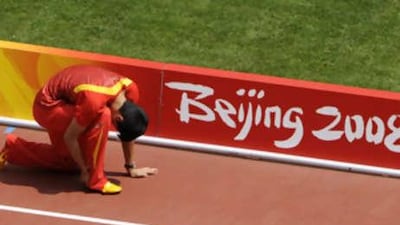BEIJING // Liu Xiang's dream of defending his Olympic title on home soil ended today when an injury forced him to hobble away from the track before his first-round heat in the 110 metre hurdles. China's world champion, the host nation's best hope of an athletics gold medal at the Beijing Olympics, was clearly out of sorts and grimaced in pain as he went down into the blocks. After a false start, he stumbled forward for a few paces obviously hindered by the injury to his right leg before walking away and leaving a packed Bird's Nest stadium in stunned silence.
"Liu Xiang has two injuries, one to his Achilles and one in his leg. One of the injuries is an old injury," his tearful coach and mentor Sun Haiping told a news conference. "It's the end of the Achilles tendon in his right foot," he added. "He will be back for sure." The China athletics team's head coach Feng Shuyong said the 25-year-old Liu had sustained the injury in training on Saturday. "This morning he felt the pain intensify," he said. "Even though he felt the pain he decided to compete in the first heat.
"Liu would not withdraw unless the pain was intolerable and there was no other way out." Along with basketball player Yao Ming, Liu is China's favourite sportsman and there was a huge weight of expectation on him to repeat his triumph of 2004, when he became his country's first male Olympic champion on the track. "I just saw him outside and he is very disappointed," Feng added. "We have done everything we can.
The son of a Shanghai lorry driver, Liu became a national hero overnight when he matched the then world record to win Olympic gold in Athens in 12.91 seconds four years ago. After a 2005 season where he struggled with injury and only managed a silver behind France's Ladji Doucoure at the World Championships, he stormed back in 2006 to set a world record of 12.88 in Lausanne. Victory in Osaka last year gave him his first world title and further ramped up the expectation that he would win gold again in Beijing.
Cuba's Dayron Robles, who qualified from his heat on Monday morning, took Liu's world record with a run of 12.87 seconds in June. Liu's preparations for the Games were disrupted by a hamstring injury which forced him to withdraw from a meeting in New York on May 31 and he had not competed in public for more than two months. *Reuters

